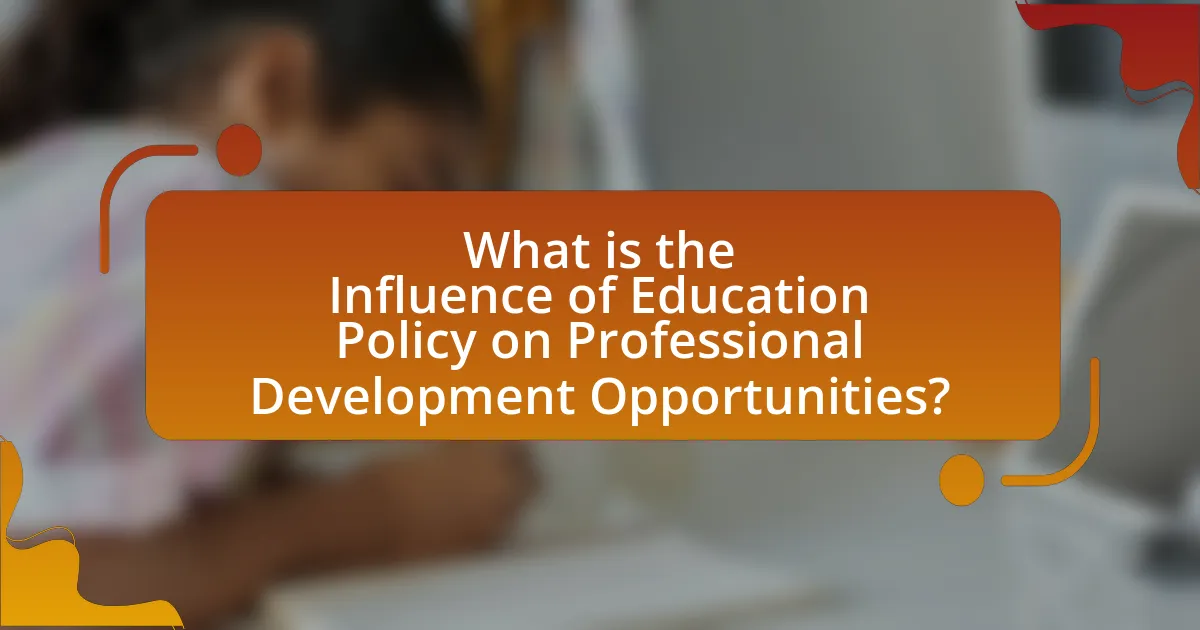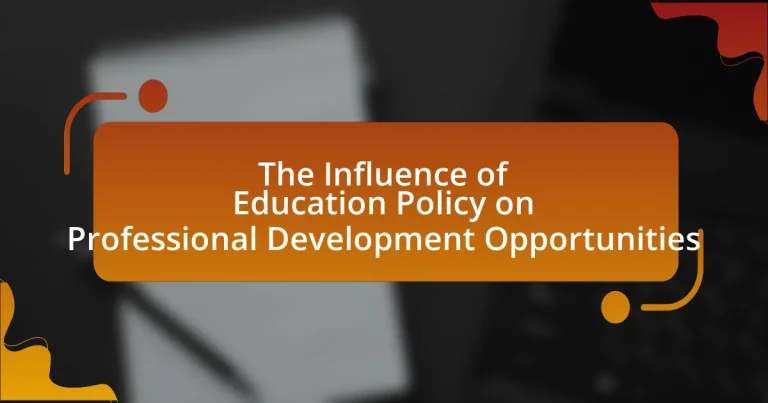The article examines the influence of education policy on professional development opportunities for educators. It highlights how policies establish frameworks that dictate funding, access, and program quality, ultimately shaping the professional growth landscape. Key components such as funding, standards, and evaluation mechanisms are discussed, along with their interaction with existing programs. The article also addresses the challenges educators face in accessing professional development, the impact of regional policy differences, and future trends in education policy, including the role of technology and continuous learning. Understanding these dynamics is crucial for educators to leverage policy for their professional growth and improve teaching effectiveness.

What is the Influence of Education Policy on Professional Development Opportunities?
Education policy significantly shapes professional development opportunities by establishing frameworks that dictate funding, access, and program quality. For instance, policies that prioritize teacher training and continuous education often lead to increased resources allocated for workshops and courses, enhancing educators’ skills. Research from the National Center for Education Statistics indicates that states with robust professional development mandates report higher participation rates among educators, demonstrating a direct correlation between policy strength and development opportunities. Furthermore, education policies that emphasize equity can ensure that underserved populations receive targeted professional development, thereby improving overall educational outcomes.
How do education policies shape professional development frameworks?
Education policies significantly shape professional development frameworks by establishing standards, funding mechanisms, and accountability measures that guide the design and implementation of training programs for educators. These policies dictate the competencies required for teachers, influencing the content and structure of professional development initiatives. For instance, the Every Student Succeeds Act (ESSA) emphasizes evidence-based practices, compelling states to align their professional development offerings with research-backed strategies to improve teaching effectiveness. Consequently, education policies not only define the goals and expectations for teacher development but also allocate resources and support systems necessary for achieving those goals, thereby directly impacting the quality and accessibility of professional development opportunities.
What are the key components of education policies affecting professional development?
Key components of education policies affecting professional development include funding, standards for professional growth, access to resources, and evaluation mechanisms. Funding is essential as it determines the availability of programs and training opportunities for educators. Standards for professional growth establish the expectations and competencies required for effective teaching, guiding the development of training programs. Access to resources, such as mentorship and technology, enhances the learning experience and supports educators in their professional journey. Evaluation mechanisms assess the effectiveness of professional development initiatives, ensuring they meet the needs of educators and improve student outcomes. These components collectively shape the landscape of professional development in education.
How do these components interact with existing professional development programs?
The components of education policy interact with existing professional development programs by shaping their structure, content, and delivery methods. For instance, policies that emphasize competency-based education require professional development programs to focus on skill acquisition and practical application, aligning training with specific educational standards. Additionally, funding allocations from education policy can determine the availability and accessibility of professional development opportunities, as seen in the Every Student Succeeds Act, which provides federal support for teacher training initiatives. This interaction ensures that professional development is not only relevant but also responsive to the evolving needs of educators and the educational landscape.
Why is understanding this influence important for educators?
Understanding the influence of education policy on professional development opportunities is crucial for educators because it directly impacts their ability to enhance teaching practices and student outcomes. Education policies dictate the availability of resources, training programs, and support systems that educators can access for their professional growth. For instance, policies that prioritize funding for teacher training initiatives can lead to improved instructional strategies and better student engagement. Research indicates that effective professional development, aligned with educational standards and policies, can increase teacher effectiveness by up to 30%, thereby significantly benefiting student learning experiences.
What implications does this influence have on teacher effectiveness?
The influence of education policy on professional development opportunities significantly enhances teacher effectiveness. When policies prioritize ongoing training and support, teachers are better equipped with updated pedagogical skills and knowledge, leading to improved student outcomes. Research indicates that teachers who engage in high-quality professional development are more likely to implement effective instructional strategies, which directly correlates with higher student achievement levels. For example, a study by the National Staff Development Council found that effective professional development can increase student performance by as much as 21 percentile points. Thus, education policies that foster robust professional development frameworks are crucial for maximizing teacher effectiveness.
How can educators leverage education policy for their professional growth?
Educators can leverage education policy for their professional growth by actively engaging with policy frameworks that promote continuous learning and development. By understanding and utilizing policies such as the Every Student Succeeds Act (ESSA), educators can access funding for professional development programs, which are often outlined in state and district plans. Research indicates that policies that prioritize teacher training and support lead to improved instructional practices and student outcomes, as seen in studies conducted by the National Center for Education Statistics. Furthermore, educators can advocate for policies that align with their professional goals, ensuring that their voices contribute to shaping the educational landscape.
What challenges arise from the influence of education policy on professional development?
The challenges arising from the influence of education policy on professional development include misalignment between policy goals and actual training needs, limited funding for comprehensive programs, and bureaucratic constraints that hinder flexibility. Misalignment occurs when policies prioritize certain skills or knowledge areas that do not reflect the real-world demands educators face, leading to ineffective professional development. Limited funding restricts the availability and quality of training opportunities, often resulting in superficial or one-size-fits-all approaches that do not meet diverse educator needs. Bureaucratic constraints can create rigid structures that prevent timely adaptation of professional development initiatives, making it difficult for educators to engage in relevant and responsive learning experiences. These challenges collectively undermine the effectiveness of professional development in enhancing teaching practices and student outcomes.
What barriers do educators face in accessing professional development opportunities?
Educators face several barriers in accessing professional development opportunities, including time constraints, financial limitations, and lack of administrative support. Time constraints arise from the demands of teaching responsibilities, which often leave little room for attending workshops or training sessions. Financial limitations can prevent educators from affording registration fees or travel costs associated with professional development. Additionally, a lack of administrative support can hinder access, as school leaders may not prioritize or facilitate opportunities for their staff. Research by the National Center for Education Statistics indicates that 40% of teachers report insufficient time as a significant barrier to professional development, highlighting the critical impact of these challenges on educators’ growth.
How do differing education policies across regions impact professional development access?
Differing education policies across regions significantly impact access to professional development by creating disparities in funding, program availability, and regulatory frameworks. For instance, regions with robust education policies often allocate more resources to professional development initiatives, leading to a wider array of training programs and opportunities for educators. In contrast, areas with limited educational funding may struggle to provide even basic professional development, resulting in fewer opportunities for teachers to enhance their skills. Research from the National Center for Education Statistics indicates that states with comprehensive professional development policies report higher participation rates among educators, demonstrating a direct correlation between policy strength and access to development opportunities.
How can education policy be improved to enhance professional development opportunities?
Education policy can be improved to enhance professional development opportunities by increasing funding for targeted training programs and creating partnerships with educational institutions. Allocating more resources specifically for professional development ensures that educators have access to high-quality training that is relevant to their needs. For instance, a study by the National Center for Education Statistics found that schools with dedicated professional development funding reported higher teacher satisfaction and retention rates. Additionally, establishing partnerships with universities can provide educators with access to advanced courses and certifications, further enhancing their skills and effectiveness in the classroom.
What best practices can be adopted from successful education systems?
Successful education systems adopt several best practices that can enhance learning outcomes and professional development opportunities. These practices include a strong emphasis on teacher training and continuous professional development, which has been shown to improve teaching quality and student performance. For instance, Finland’s education system invests heavily in teacher education, requiring a master’s degree for teachers and providing ongoing training, resulting in high student achievement and satisfaction.
Additionally, successful systems implement data-driven decision-making, utilizing assessments to inform instructional strategies and curriculum development. In Singapore, the use of regular assessments allows educators to tailor their teaching methods to meet the diverse needs of students, leading to improved academic results.
Collaboration among educators is another best practice, as seen in Japan’s lesson study approach, where teachers work together to plan, observe, and analyze learning experiences. This collaborative model fosters a culture of continuous improvement and shared expertise, ultimately benefiting student learning.
Lastly, successful education systems prioritize equity and access, ensuring that all students receive the support they need to succeed. For example, Canada’s inclusive education policies focus on providing resources and support for students with diverse learning needs, contributing to overall educational success.
These best practices, supported by evidence from various successful education systems, can be effectively adopted to enhance professional development opportunities and improve educational outcomes.
How can stakeholder collaboration improve policy outcomes for professional development?
Stakeholder collaboration can significantly improve policy outcomes for professional development by ensuring diverse perspectives are integrated into the decision-making process. When stakeholders, including educators, administrators, policymakers, and community members, work together, they can identify the specific needs and challenges faced in professional development, leading to more targeted and effective policies. Research indicates that collaborative approaches in education policy result in higher satisfaction rates among educators and improved implementation of professional development programs, as seen in studies conducted by the Learning Policy Institute, which found that inclusive stakeholder engagement leads to policies that are more responsive and sustainable.
What are the future trends in education policy regarding professional development?
Future trends in education policy regarding professional development include a shift towards personalized learning experiences, increased integration of technology, and a focus on equity and access. Personalized professional development will allow educators to tailor their learning to specific needs, enhancing effectiveness. The integration of technology, such as online platforms and virtual coaching, will facilitate ongoing learning and collaboration among educators. Additionally, policies will increasingly emphasize equitable access to professional development resources, ensuring that all educators, regardless of their background or location, have opportunities for growth. These trends are supported by research indicating that personalized and equitable professional development leads to improved teaching practices and student outcomes.
How is technology influencing professional development policies?
Technology is significantly influencing professional development policies by enabling more flexible, accessible, and personalized learning experiences. Online platforms and digital tools facilitate continuous learning, allowing professionals to engage in training at their own pace and convenience. For instance, a report by the World Economic Forum highlights that 94% of business leaders expect employees to pick up new skills on the job, underscoring the need for adaptable professional development frameworks that technology supports. Additionally, data from the National Center for Education Statistics indicates that institutions increasingly incorporate technology into training programs, leading to enhanced engagement and retention rates among participants.
What role does continuous learning play in future education policies?
Continuous learning is essential in shaping future education policies as it fosters adaptability and skill enhancement in an evolving job market. Education policies increasingly emphasize lifelong learning to ensure that individuals can continuously update their knowledge and skills in response to technological advancements and changing workforce demands. For instance, the World Economic Forum’s “Future of Jobs Report” highlights that by 2025, 85 million jobs may be displaced while 97 million new roles could emerge, underscoring the necessity for continuous learning frameworks in education systems. This integration of continuous learning into education policies not only prepares students for future employment but also promotes a culture of ongoing professional development among educators, ensuring that teaching practices remain relevant and effective.
What practical steps can educators take to navigate education policy for professional development?
Educators can navigate education policy for professional development by actively engaging with policy documents and participating in relevant training sessions. Understanding the specific policies that govern professional development, such as state mandates and district guidelines, allows educators to align their professional growth with institutional expectations. Additionally, joining professional organizations and networks can provide insights into best practices and emerging trends in education policy. Research indicates that educators who are informed about policy changes are better equipped to advocate for their professional needs, leading to more effective development opportunities. For instance, a study by the National Education Association highlights that educators who participate in policy discussions are more likely to influence the direction of professional development initiatives in their schools.


